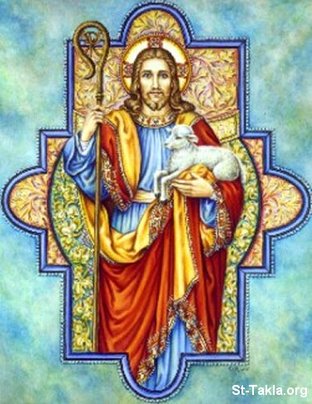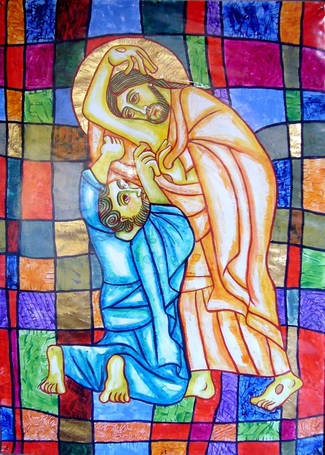
John 10: 22-30; Acts 9:36-43; Rev. 7:9-17; Psa. 23
So which team are you routing for?
Team Adam Levine?
Team Blake Shelton? Team Christine Aguilera or Team Pharrell Williams? Some of us may – or may not -- have recognized the trademark names of the reality TV series, “the Voice,” which like the widely popular shows like American Idol (which just ended after 15 seasons) and X Factor, seek to bring the best and brightest talent, the next singing sensation, the greatest singer, to the American audience.
Whether you watch these shows or not, we are in a season of discerning the voices. For the past year, no matter where your politics lie, we have been listening to presidential candidates try and convince us they are the right man, or woman, for the job. This church is in a season of discernment. Where is God calling us? What shall we do with the resources at hand? Each of us must discern our faith journey and how we devote our time, energy and resources.
The challenge for us is to discern God’s voice among all the voices we hear. There are a lot of voices out there telling us who we are, what we should want, who we should be. What voice, whose voice are we listening to?
There are voices telling us to do this, don’t do that. Eat your vegetables. Don’t eat that greasy hamburger! Buy this, drive that, wear this, go there. On and on the voices come at us – through TV, radio, ads, our neighbors, friends, family, the church -- It is too much – no wonder we’re exhausted from all that listening.
In our gospel lesson, a Jewish faction gathers around Jesus and asks, “tell us plainly, are you the messiah? “ Jesus doesn’t answer them directly because he knows they aren’t true believers. They would just use his words against him. So instead, Jesus tells them: “My sheep hear my voice. I know them, and they follow me.”
If we are Jesus followers, we will know his Voice, and be able to pick it out from the din that surrounds us. What a powerful, comforting thought. Scientists tell us that newborns know their mother’s voice from the womb. Doctors also tell us that the last sense to leave us is hearing, and encourage us to speak gently and lovingly to a comatose patient. So we, from birth to death are shaped by the life of faith, through baptism, anointed by the Holy Spirit, to know The Voice of Jesus.
We know the voice of Jesus, but it can get muffled by the sheer variety of voices and messages we hear. We can even listen to our own voice and confuse it with God’s. It is difficult to tune out all other voices to discern the voice of Jesus speaking to us. We can get to the place where we are not aware of our lack of hearing The Voice.
I came across a humorous example that spells out this point. A man decided his wife was getting hard of hearing. So he called her doctor to make an appointment to have her hearing checked. The doctor said he could see her in two weeks, but meanwhile there was a simple, informal test the husband could do to give the doctor some idea of the dimensions of the problem.
“Here’s what you do,” he said. “Stand about 40 feet away from her, and speak in a normal conversational tone and see if she hears you. If not, go to 30 feet, then 20 feet, and so on until you get a response.”
That evening his wife is in the kitchen cooking dinner, and he’s in the living room, and he says to himself, “I’m about 40 feet away, let’s see what happens.”
“Honey, what’s for supper?” No response.
So he moves to the other end of the room, about 30 feet away.
“Honey, what’s for supper?” No response.
So he moves into the dining room, about 20 feet away. “Honey, what’s for supper?” No response.
On to the kitchen door, only 10 feet away. “Honey, what’s for supper?” No response.
So he walks right up behind her. “Honey, what’s for supper?”
She turns around and says, “For the FIFTH time, CHICKEN!!!!”
The man learned he was the deaf one after all. If we are not hearing God it is not because God is deaf. We need to get closer to God.
Our texts today help us with how we are to listen to the true Voice. It is the actions and the scriptures that accompany the voice that tell us the identity of The Voice, and whom we should follow. The actions in the scriptures confirm The Voice.
In our reading from Acts, Peter raises from the dead a beloved follower named Tabitha, or Dorcas, who cared for the widows of Joppa. The word widow in Hebrew comes from a root that means “mute,” or “silent.” It aptly describes the status of widows in the ancient world: powerless, defenseless, vulnerable, most often poor and destitute. So Tabitha had a ministry with widows, those who were silenced. Peter, after praying, tells Tabitha to get up. Peter takes Tabitha by the hand and helps her up. Tabitha is alive again.
We know The Voice of Jesus because The Voice originates from the care of those who are powerless and most vulnerable in our world. We know The Voice of Jesus because it tells us, like Peter did, to get up. The Voice of Jesus raises those aspects of us that have been long dead and buried back to life. To dream. To hope. The ability to forgive and move on. The ability to see with new eyes. All brought back to life. The Voice of Jesus takes us by the hand and helps us up, and restores us to life.
The actions in the scriptures confirm The Voice.
Our psalmist describes our Lord as a shepherd who makes us lie down in green pastures, and leads us to still waters. God cares for us.
The actions in the scriptures confirm The Voice.
God restores our soul. When our soul have become wearied or worn down, God is our restorer.
The actions in the scriptures confirm The Voice.
God leads us right paths; God leads us through the valley of the shadow of death. God guides and protects.
The actions in the scriptures confirm The Voice.
Even in our trials God sustains us, anoints us and makes our cup overflow.
The actions in the scriptures confirm The Voice.
So we find The Voice of God whenever we too, care for one another, when we work to restore one another, when we companion one another on right paths, those paths through the darkest valleys.
We find The Voice when we sustain and bless one another through trials. Even our reading in the Book of Revelation reminds us that the multitudes, from every nation, tribe and peoples and languages, coming through sacrifice, cry out and sing to God in praise.
Their actions in the scriptures confirm The Voice.
Ultimately we find the beautiful, ancient yet ever new voice of God in the acts of caring for others. Do we want to be sure that we hear God? Let us listen to those in need: whatever the need, within our congregation and in our larger community. This is where we will hear God speaking.
Let the actions of God speak to us so we will listen with full attention. Let us tune out the voices of despair, of judgment and fear. Instead let us listen to The Voice.
The Voice that cared for widows.
The Voice that says, “get up.”
The Voice that reaches out a hand and helps up.
The Voice that can summon the dead to life.
The Voice that nourishes, restores, leads and protects, that voice that feeds through affliction and blesses.
The Voice that praises through suffering. Do we hear that voice? Do we hear that Voice? Let us get close to it.
That is The Voice of Jesus. It will become our voice too, if we listen faithfully to it.
It will become our voice too if we follow it with all our hearts.
It will become our voice too if we act, like Peter did, like the Good Shepherd does. It will become our voice too if, in Jesus’ name – we choose to speak – on Team Jesus.
Amen.


 RSS Feed
RSS Feed